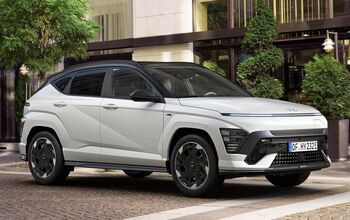Approximately 1 Out of Every 100 Ford Mustangs Sold in America Are Lebanon Ford Roush-Supercharged Mustangs
“Three to five 727-horsepower Mustangs leave the lot daily,” TTAC’s associate editor, Steph Willems, wrote this past weekend.
Naturally, that got me thinking.
After Ohio’s Lebanon Ford dealer began marketing its 727-horsepower Lebanon Ford Performance Mustang GT as a $39,995 performance bargain, Chris Tonn’s story blew up on TTAC a month ago. Now, Lebanon Ford answers 1,000 Performance Mustang-related inquiries per day and says it sells three to five per day.
So let’s do some math. It’ll be fun.
Using May 2016’s results as a basis for our approximations, there were 24 selling days and 10,327 Ford Mustangs sold in the United States.
At three copies of the 727 Lebanon Ford Performance Mustang sold per day, and 24 selling days, Lebanon Ford could move 72 in a given month. That’s 0.7 percent of the Mustangs sold in America coming with Roush superchargers from one Ohio dealer, a store which accounts for just 0.03 percent of the Ford dealers in America.
And we’re not even counting the other Mustang business Lebanon Ford has drummed up by the abundantly powered Phase 2 supercharged Mustang.
Granted, about 40 percent of the Lebanon Ford Performance Mustang business is carved out by the Phase 1 car, which produces — get this — only 670 horsepower. Pfft.
Then again, at the upper end of the spectrum, Lebanon Ford says they’re moving approximately five supercharged Mustangs per day, or three Phase 2 cars — 0.7-percent of the nationwide Mustang market — and two Phase 1 cars. At five per day, Lebanon Ford would be selling around 120 670/727-horsepower cars in a given month. This would equal 1.2 percent of America’s Mustang market originating at one Ford dealer in a southwestern Ohio town of about 20,000 people.
Timothy Cain is the founder of GoodCarBadCar.net, which obsesses over the free and frequent publication of U.S. and Canadian auto sales figures. Follow on Twitter @goodcarbadcar and on Facebook.
More by Timothy Cain
Latest Car Reviews
Read moreLatest Product Reviews
Read moreRecent Comments
- Kjhkjlhkjhkljh kljhjkhjklhkjh A prelude is a bad idea. There is already Acura with all the weird sport trims. This will not make back it's R&D money.
- Analoggrotto I don't see a red car here, how blazing stupid are you people?
- Redapple2 Love the wheels
- Redapple2 Good luck to them. They used to make great cars. 510. 240Z, Sentra SE-R. Maxima. Frontier.
- Joe65688619 Under Ghosn they went through the same short-term bottom-line thinking that GM did in the 80s/90s, and they have not recovered say, to their heyday in the 50s and 60s in terms of market share and innovation. Poor design decisions (a CVT in their front-wheel drive "4-Door Sports Car", model overlap in a poorly performing segment (they never needed the Altima AND the Maxima...what they needed was one vehicle with different drivetrain, including hybrid, to compete with the Accord/Camry, and decontenting their vehicles: My 2012 QX56 (I know, not a Nissan, but the same holds for the Armada) had power rear windows in the cargo area that could vent, a glass hatch on the back door that could be opened separate from the whole liftgate (in such a tall vehicle, kinda essential if you have it in a garage and want to load the trunk without having to open the garage door to make room for the lift gate), a nice driver's side folding armrest, and a few other quality-of-life details absent from my 2018 QX80. In a competitive market this attention to detai is can be the differentiator that sell cars. Now they are caught in the middle of the market, competing more with Hyundai and Kia and selling discounted vehicles near the same price points, but losing money on them. They invested also invested a lot in niche platforms. The Leaf was one of the first full EVs, but never really evolved. They misjudged the market - luxury EVs are selling, small budget models not so much. Variable compression engines offering little in terms of real-world power or tech, let a lot of complexity that is leading to higher failure rates. Aside from the Z and GT-R (low volume models), not much forced induction (whether your a fan or not, look at what Honda did with the CR-V and Acura RDX - same chassis, slap a turbo on it, make it nicer inside, and now you can sell it as a semi-premium brand with higher markup). That said, I do believe they retain the technical and engineering capability to do far better. About time management realized they need to make smarter investments and understand their markets better.


































Comments
Join the conversation
Alternately, if Lebanon Ford was actually selling 120 Roush Mustangs at a $4000/unit discount, they’d be losing nearly half a million dollars a month for the dealer. They didn’t hire a bunch of new mechanics to keep up with demand, they just expanded the call center. Classic bait & switch, on an internet scale.
They've come this far, Lebanon should go full "Saleen" with available aftermarket brakes, suspension, seats, wheels, etc. besides the 727 HP, icing on the cake. A recognizable "package" would get instant "street cred". Just not a whale tail.